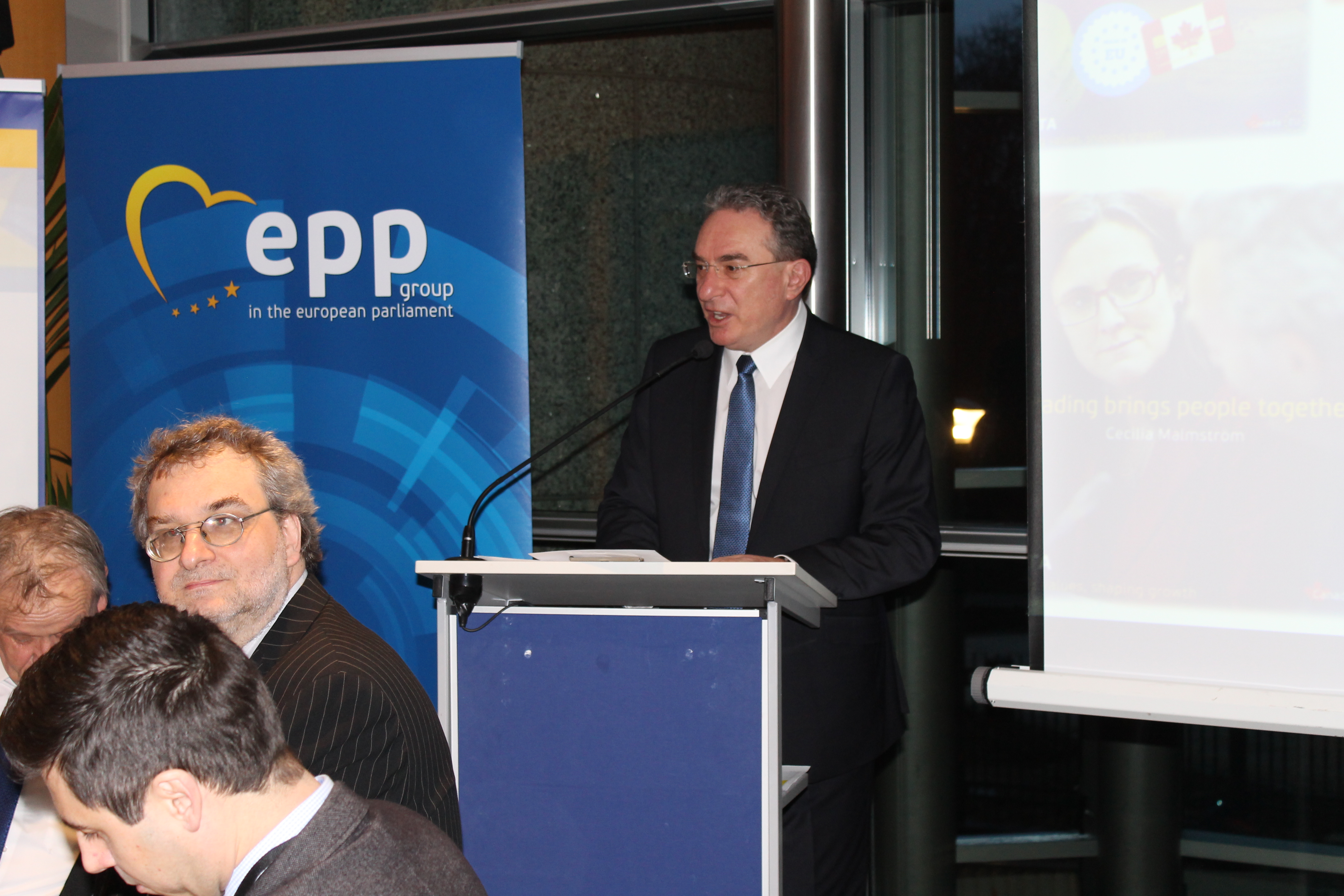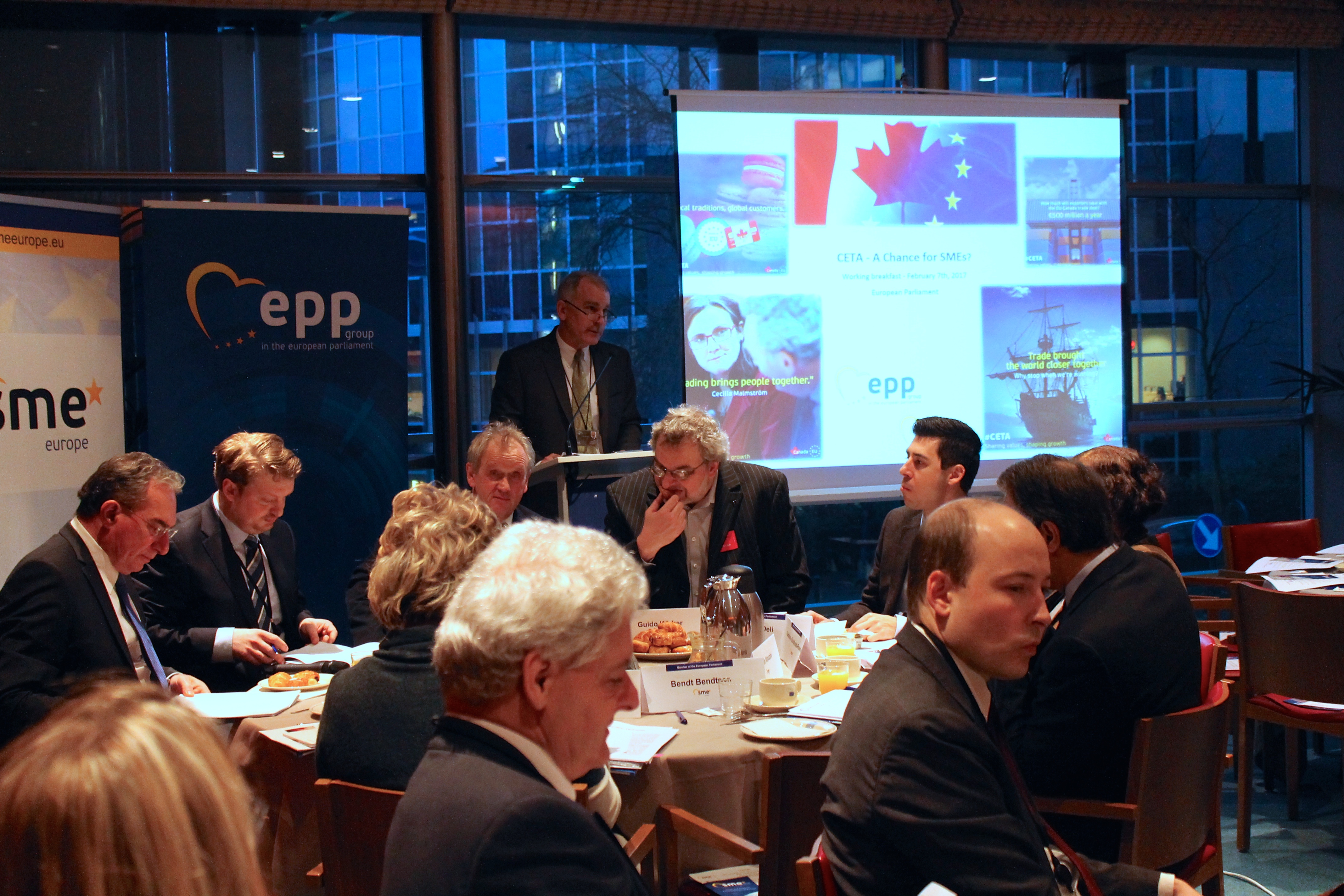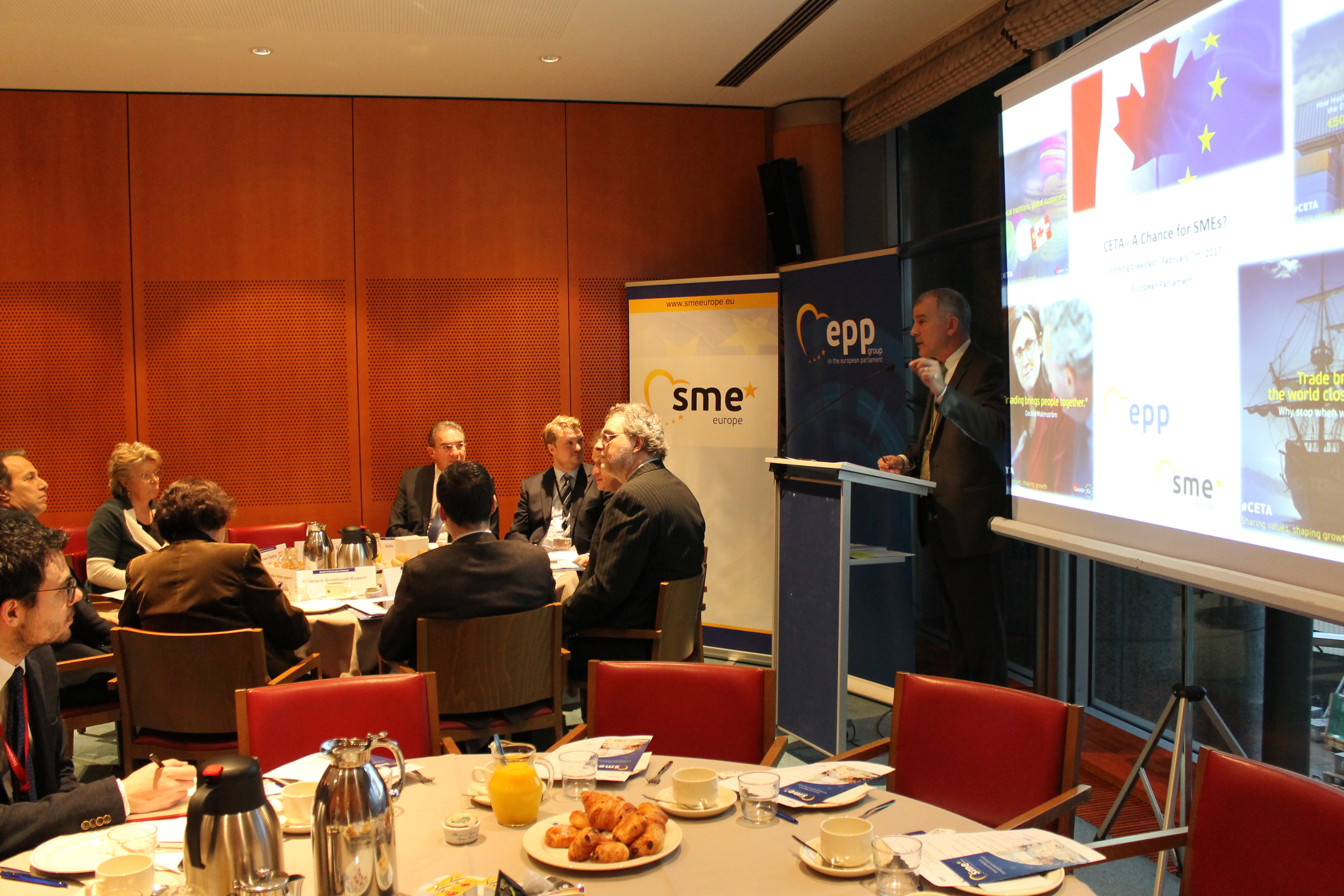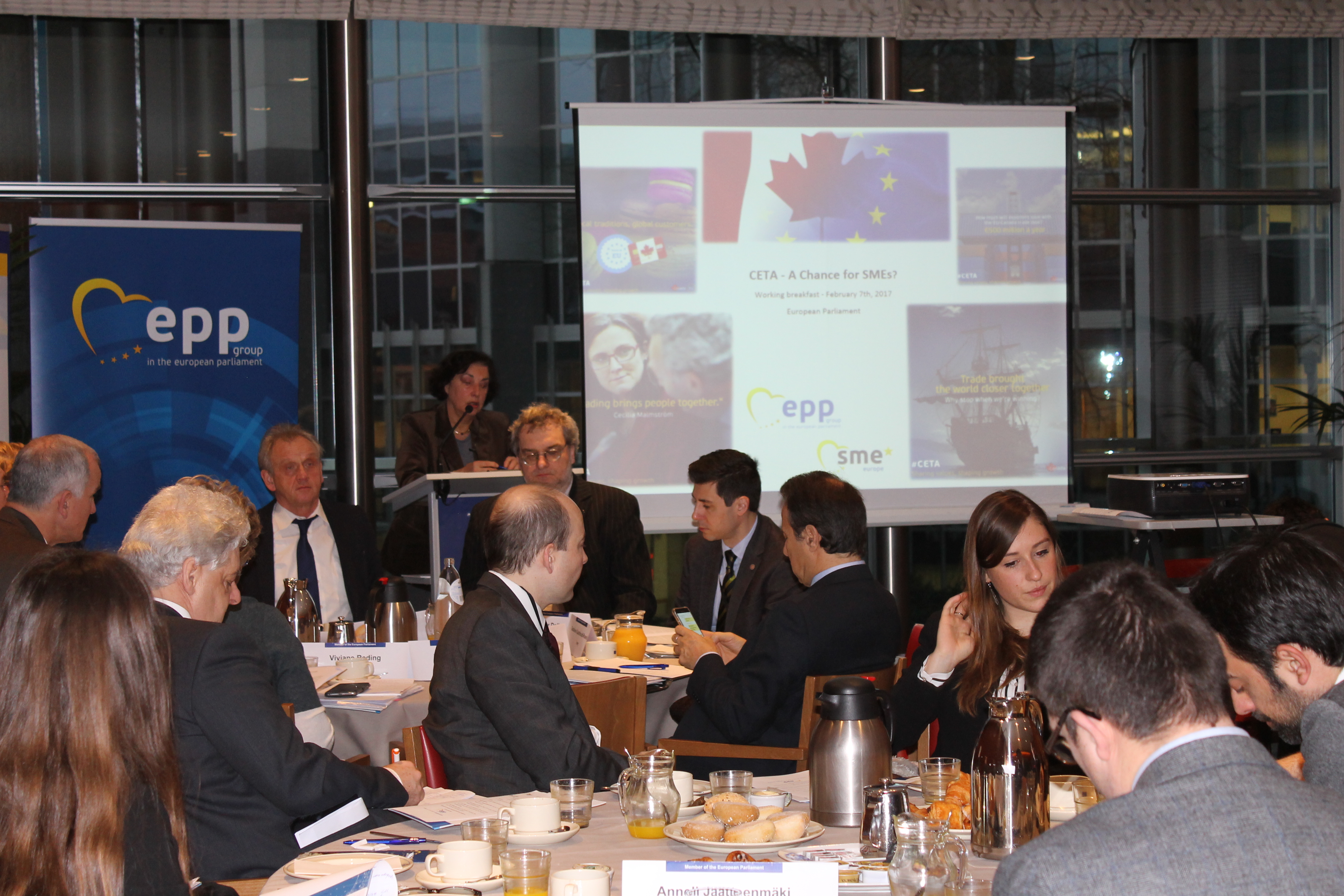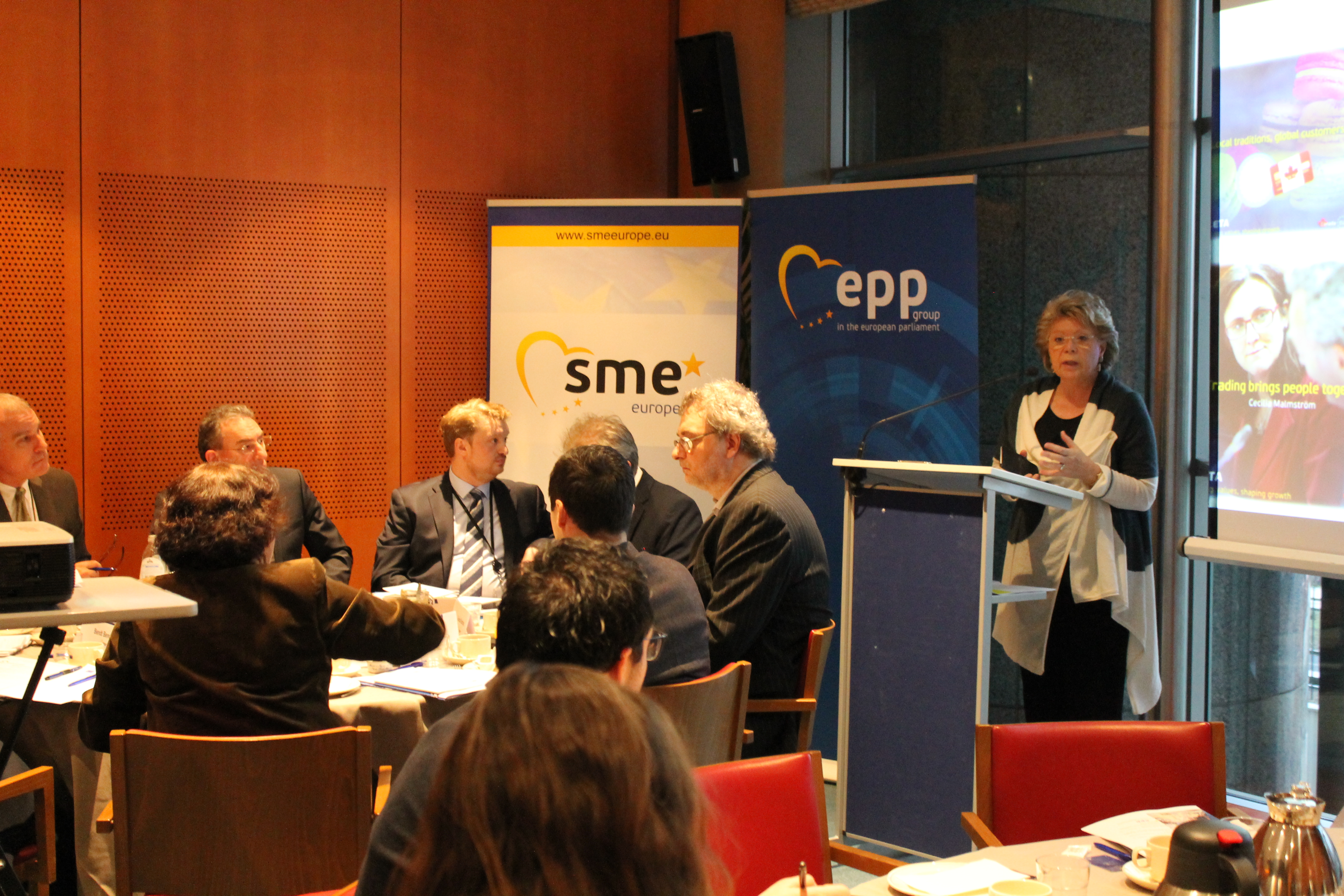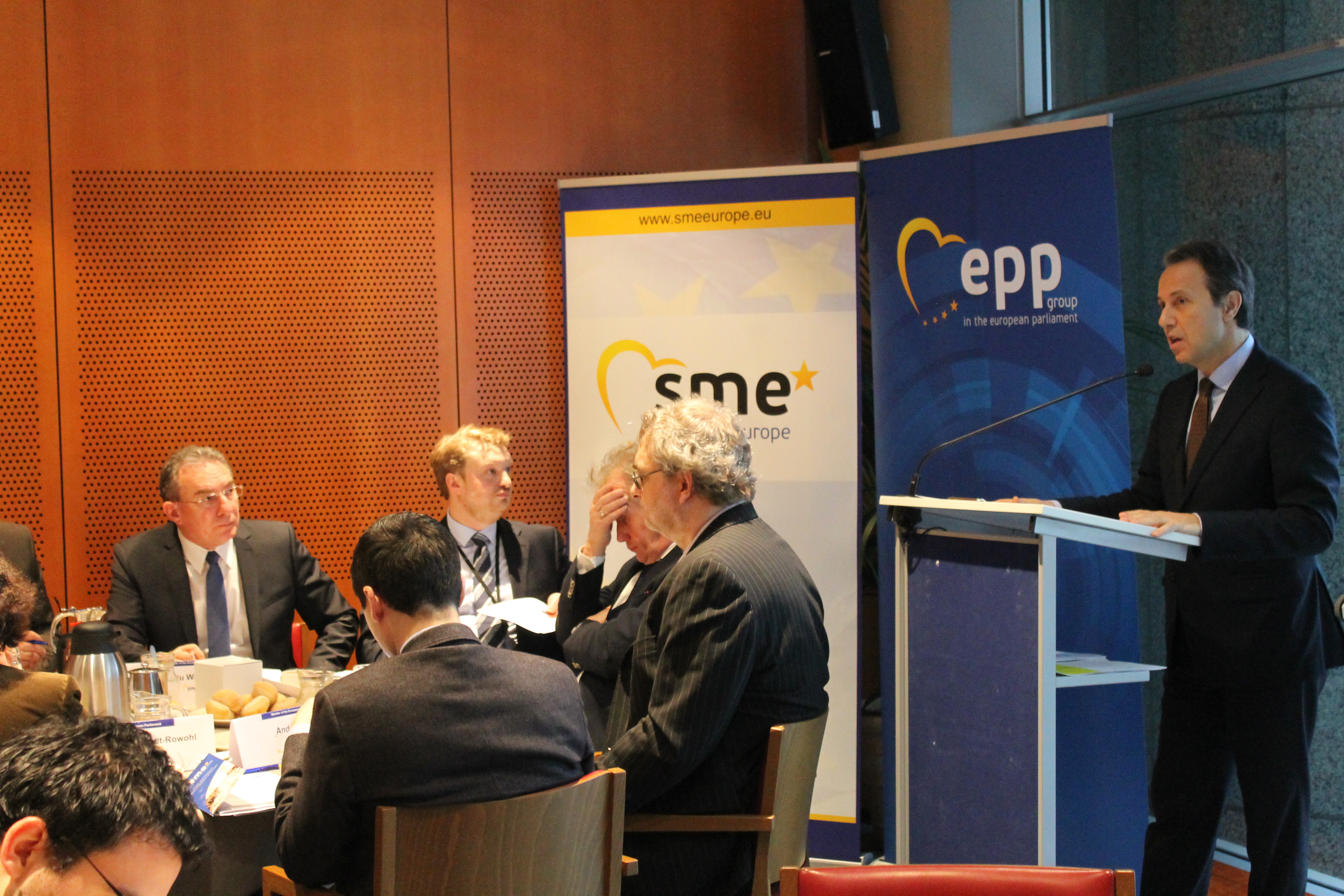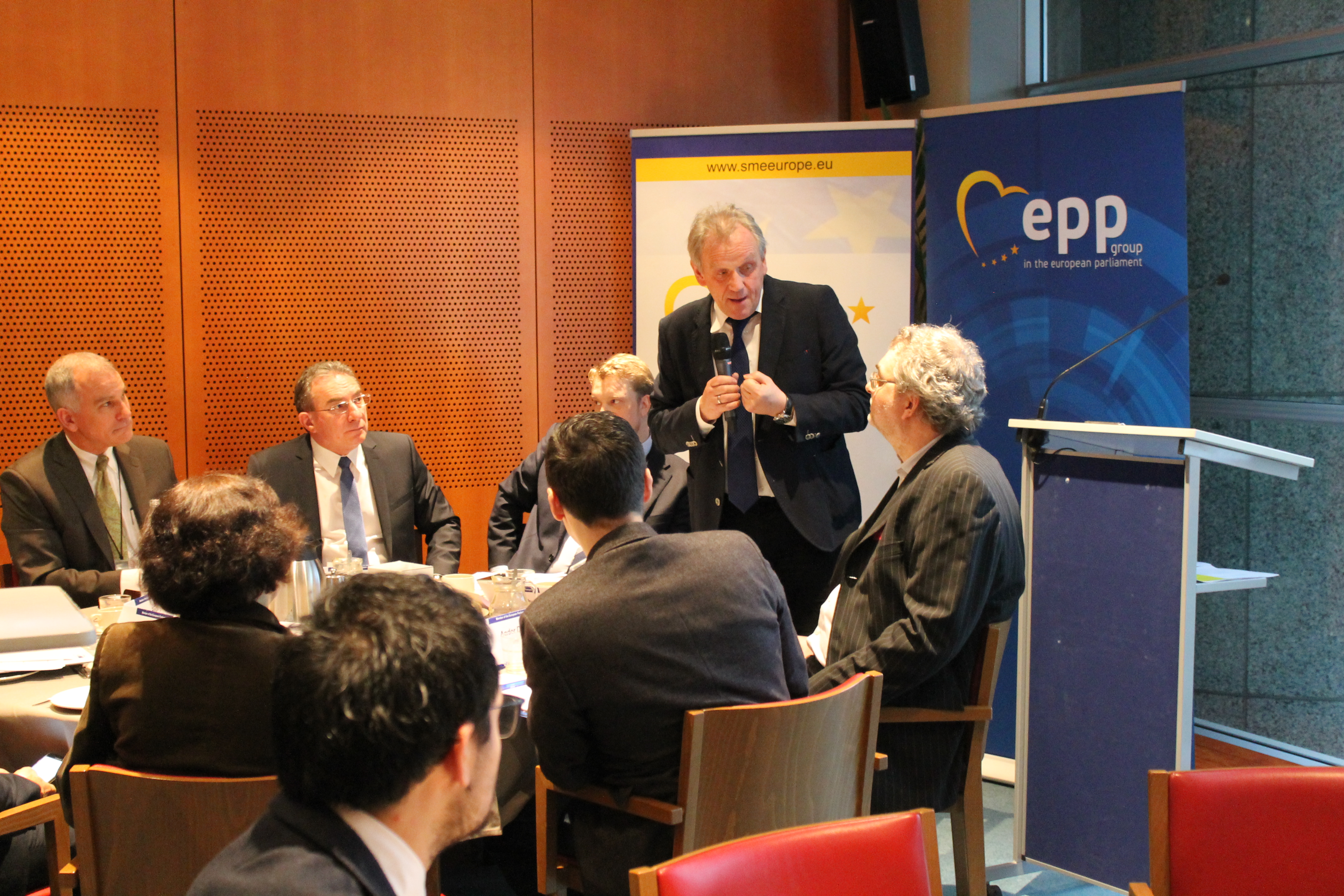CETA – a Chance for SMEs?
On the 7th of February, a member of the European Parliament (MEP), Mr. Iuliu Winkler hosted a working breakfast on the opportunities that the Comprehensive Economic and Trade Agreement (CETA) will bring to SMEs, in cooperation with our association, SME Europe. The event took place in the European parliament and was attended by a comprehensive group of European stakeholders and MEPs from across the board. As host of the event, MEP Winkler and First Vice-President of SME Europe, opened the floor to the working breakfast, sharing with the attending audience the future and great benefits he believes CETA will bring to European SMEs. After a clear and concise speech, MEP Winkler introduced His Excellency Ambassador Daniel J. Costello to the audience, and gave him the floor.
In his intervention, Ambassador Costello keenly emphasized the similarities that the European Union (EU) and Canada share as trading partners. The Ambassador spoke of the overlapping values, and historical and bounded roots, that both societies share. To the Ambassador this historical common values and roots make for an EU-Canada partnership that assures the progress and developments of both societies through CETA.
“It is more than a classical trading agreement” – said Ambassador Costello of CETA.
Additionally, Ambassador Costello advised European stakeholders, especially SMEs, to not be afraid of the Canadian Market.
“Why should a potential market of 500 million consumers be scared of an allied nation with 35 million inhabitants?” – said Ambassador Costello. Canada is not only an allied with similar values, but also a society willing to engage in sustainable free trade with the EU.
The Ambassador’s honorary Keynote speech was dynamic and full of strong arguments on the benefits CETA could bring to both EU and Canadian societies. Nevertheless, Ambassador Costello also addressed and acknowledged the fears that an array of European stakeholders have with CETA. In an effort to appease European fears towards CETA, the Ambassador spoke of the benefits and developments that the North American Free Trade Agreement (NAFTA) brought for the societies of Mexico, Canada, and the United States (US). Like some European stakeholders with CETA today, in the past, Canadians feared NAFTA due to a bigger inflation rate compared to the one in the US. However, the Canadians saw their fears to be unnecessary as NAFTA proved to be a beneficial trade agreement for the trading partners, the same way CETA can be for the EU and Canada.
Ambassador Costello invited European SMEs to not fear CETA or see it as a threat to their businesses, but rather see it as a chance to elevate their enterprises. Within its territory, Canada has a total of 10 provinces, and 3 territories, all eager and willing to initiate boundless and borderless trade with European SMEs. Canadian SMEs understood the importance of CETA and the benefits it can bring for both trading partners, and thus are in favour of the trade agreement.
Moreover, Ambassador Costello also addressed the rumours that CETA is a backdoor for the Transatlantic Trade and Investment Partnership (TTIP). He made a clear emphasize on the fallacy that this rumour is, and reminded the attending European stakeholders that CETA was, is, and will continue to be an independent agreement negotiated between the EU and Canada, with no relation to the TTIP negotiations.
His tenor in general was to build bridges instead of dividing barriers, and how free trade is beneficial for both Canada and the EU. He assured the attendees that European consumers and producers should not fear CETA because its legislation will be in the hands of the national governments, and no supranational regulation will take precedent. What’s more, the Ambassador reminded the attendees that CETA will by no means lower European consumers’ and producers’ standards.
Once Ambassador Costello concluded his speech, the floor was given to MEP Mrs. Godelieve Quisthoudt-Rowohl. In her intervention, MEP Quisthoudt-Rowohl spoke of the positive vote on CETA that took place in the International Trade Committee (INTA) and welcomed it as stepping stone in the staircase towards a better future for European SMEs. Due to her position as the Vice-Chair of the Delegation for relations with Canada of the EP and member of the INTA committee her expertise on the topic at hand was an asset for the discussion that took place in the event. On her speech, MEP Quisthoudt-Rowohl made an emphasis on her belief that CETA is a highly ambitious agreement, and “the most significant trade agreement in the past years” negotiated between the EU and a prospective trading partner. She spoke of the transatlantic stability that CETA could give both partners, and welcomed it as a needed development for both markets.
MEP Quisthoudt-Rowohl also spoke of the benefits that cutting tariffs will bring to both societies, saying that “95% of the goods will be duty free” guarantee better prices for European consumers, and a wider variety of goods where to choose from, that maintain the usual and expected European standards. She brought forward the example of the European textile industry, and how it will greatly benefit of the duty free status that CETA will bring forward.
Lastly, she closed her speech by drawing attention to the private arbitration tribunals that have been agreed to under CETA, and its benefits over public ones, saying that “at a game of poker, nobody will show his cards”.
After MEP Quisthoudt-Rowohl’s speech, MEP Mrs. Viviane Reding, a member of INTA and former Vice-President of the European Commission, took the floor and enthusiastically spoke about the importance to maintain and keep European standards in CETA. “We have to be standard-makers, not standard-takers” – said MEP Reding, and called CETA a crucial enabler and engine for growth, prosperity and the maintenance of European standards. She then moved to emphasize the importance of transparency and public communication amongst political Institutions to safeguard European stakeholders are fully informed on the ways CETA can best benefit them. She stressed the responsibility that as public servants MEPs have to inform the public on the realities of CETA, citing a twitter campaign on CETA that she launched to deliver information to the public on the benefits and guarantees of CETA. She reminded the attendees to the event, that CETA is not the problem, anti-globalization IS.
Once MEP Reding finished her speech, the floor was given to Mr. Arnaldo Abruzzini, the Chief Executive Officer (CEO) of the Association of European Chambers of Commerce and Industry. On his speech, Mr. Abruzzini, spoke on how CETA hand in hand with globalization will further expose Europe to the global market and further raise it competitiveness in it. Mr. Abruzzini also stressed the importance of transparency from the political institutions with CETA, saying that “full transparency of the legislation process will engage those who have concerns about the agreement (CETA)”. Lastly, he close his speech reminding attendees of the similarity in values that both trade partners have, and how this is an asset in terms of trade negotiations and implementation.
The final speaker of the working breakfast was Mr. Guido Körber, the Director of Code Mercenaries and Member of the advisory board of the German initiative “Business for Responsible Trade”. Unlike the other attending speaker, Mr. Guido had a more reserved and doubtful opinion on CETA. With his intervention, Mr. Körber shared with the attendees his worries on the differences that Canadian and EU Technical Inspections Agencies have and how that could be detrimental for some SMEs, and consumers. Mr. Körber believes the inspection systems to be too different for a successful harmonization, and thus it could be a rather harmful system for European SMEs. The European system is based on a general declaration of conformity while the Canadian system, is based on a mandatory certification, a difference that Mr. Körber believes will bring more problems than benefits to European SMEs.
“We do not need two standards for one issue” – said Mr. Körber on the difference of the systems.
The harmonization of the common European domestic market lowered down 1.4 Million standards to 160.000. Once Mr. Körber closed his speech, MEP Mr. Peter Jahr took the floor for a small intervention, on which he summarized the intervention of all previous speakers and his satisfaction to hear both supportive and critical opinions on CETA. He then moved to underline the importance to continue working on “compromises and more harmonization” because the European society needs “more trade agreements and globalization”.
After MEP Jahr short intervention, MEP Mr. Andor Deli also took the floor to thank all speakers and attendees for their commitment to an open discussion and layed emphasis on how CETA will not lower the standards of European goods. Lastly, he reminded attendees that if CETA is implemented, implementation will be slow, but the success will be seen.
Lastly, our association’s President, MEP Mr. Bendt Bendtsen, took the floor for a small statement. In his statement, MEP Bendtsen spoke about the new wave of protectionism that seems to be gaining momentum worldwide, and how detrimental this doctrine is for our economies. He told attendees to the event, that in the past, Denmark feared the eastwards expansion that the EU decided to take when it allowed the entrance of Poland into the Union. Luckily, those fears proved to be wrong, just like the fears of the Canadians towards NAFTA, and Denmark received great benefits from Poland’s addition to the Union. The Danish GDP soared, and loans were lowered in Poland. Since its entry to the Union, the Polish GDP has almost tripled, and exports between Denmark and Poland have increased up to 19 billion euros.
After MEP Bendtsen’s intervention, the floor was opened for a round of Q&As with the moderation of Dr. Horst Heitz, Executive Director of SME Europe of the EPP.

